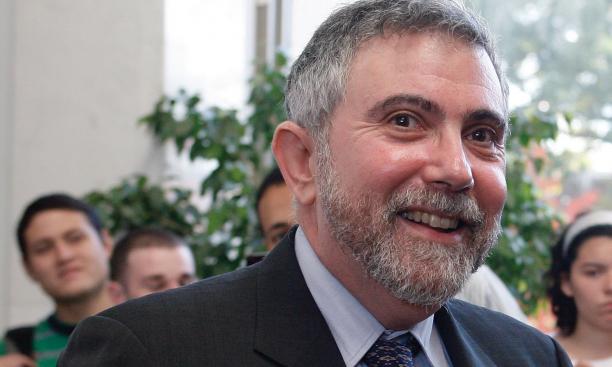

Looking somewhat sheepish before a packed press conference Oct. 13 in Robertson Hall, economist Paul Krugman accepted the congratulations of friends, students, and colleagues as the recipient of the 2008 Nobel Memorial Prize in Economic Sciences.
A professor in the economics department and the Woodrow Wilson School, Krugman earned the award for groundbreaking research in the fields of international trade and economic geography. He is more widely known for his twice-weekly column in The New York Times.
Traditional economic theory posits that nations trade only those products that they enjoy a comparative advantage in producing. For that reason, to take what might be an Econ 101 example, France would produce wine and the United States cars. Beginning in the late 1970s, Krugman noticed that countries did not behave this way in the real world, and that instead a handful of countries dominate world trade, often exporting and importing the same types of goods. Krugman theorized that this happens because consumers seek diversity in their purchases, which enables a few countries to produce and trade products with only slight variations. Thus, France and the United States both produce wine and cars and sell them to each other.
The University lists 32 Nobel Prize winners: 17 alumni and 15 non-alumni faculty and staff. Physics accounts for 17 of the awards, followed by economics, with eight. Woodrow Wilson 1879 was the first Princetonian to win a Nobel Prize – the peace award in 1919.
In the 1990s, Krugman investigated why economic activity tends to be concentrated in particular geographic areas. He concluded that, because of the importance of transportation costs, producers tend to locate in areas where demand is high and a source of supply is convenient. Because those areas tend to be ones in which other producers have already settled, Krugman wrote, concentrations of industry often are self-sustaining.
Avinash Dixit, the John J.F. Sherrerd ’52 University Professor of Economics, who collaborated with Krugman in some of his pioneering research, said that Krugman “can take quite complex questions and reduce them to the simple essential insight.”
The day of the prize announcement was a typically hectic one for Krugman, who, when the phone rang with the news, at first thought that the caller from the Royal Swedish Academy of Sciences was a prankster with a phony Swedish accent. “To be absolutely, totally honest, I thought this day might come someday, but I was absolutely convinced it wasn’t going to be this day,” Krugman said in an interview with The New York Times. “I know people who live their lives waiting for this call, and it’s not good for the soul. So I put it out of my mind and stopped thinking about it.”
Keeping up his schedule, Krugman traveled to Washington that morning to attend a meeting of international financial experts, returning to Princeton just in time for his afternoon press conference. He arrived in typical fashion, wearing a business suit and carrying an old black knapsack. “My God,” he joked, “one Nobel Prize can discombobulate your whole day.”
Krugman received a minute-long standing ovation as he entered the auditorium. Wilson School dean Anne-Marie Slaughter ’80 hailed Krugman as a “boundary-crosser” — for blending economic disciplines and for combining his academic work with his position as a public intellectual and columnist. President Tilghman joked that she, like many, has learned economics by reading Krugman’s newspaper columns.
In those columns, Krugman has been a particularly unrelenting critic of the current administration, and he could not resist taking a few shots at President Bush in his press conference. Asked why several recent Nobel prizes seem to have been awarded to critics of the president, he deadpanned that Nobel Prizes are given to intellectuals, and most intellectuals are anti-Bush.
In response to questions about the current financial crisis, Krugman argued that the problem was not what regulators did, but what they did not do, failing to keep up with an economy that had outgrown the old regulatory framework.
Krugman, who earned a bachelor’s degree from Yale and a Ph.D. from MIT, joined the Princeton faculty in 2000, the year he began writing his New York Times column. From 1982 to 1983, he served as a member of the president’s Council of Economic Advisers. In 1991, he won the John Bates Clark Medal, which is awarded biennially by the American Economic Association to the top economist under the age of 40. He has written or co-authored two dozen books, most recently The Great Unraveling (Norton 2003), and appears frequently on Sunday-morning talk shows.
Krugman will accept the prize, which includes an award of 10 million Swedish krona (about $1.4 million), Dec. 10 in Stockholm. He is the 11th member of the current Princeton faculty (including emeritus professors) to earn a Nobel Prize, and joins four others who have won the economics prize over the years.
